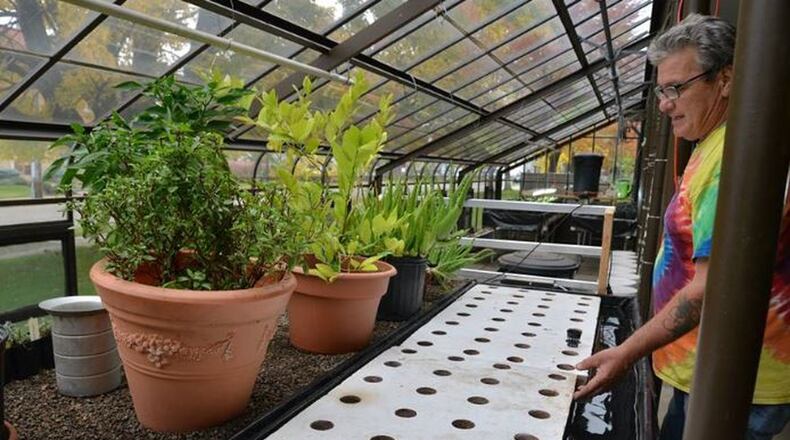He created a garden there about four years ago so residents in the subsidized-housing complex could grow their own food.
MORE: Rooftop gardening coming to Hamilton
On Thursday, Nov. 9, Hall and a representative of Rich Plant Medium will offer a talk from 6 to 8 p.m. at Miami University Hamilton’s downtown location (221 High St.) about growing food using technology.
Three years ago, he persuaded the housing authority to let him use a greenhouse that’s attached to the building.
In the next couple of weeks, Hall plans to launch an experiment in the greenhouse, using four experimental “indoor controlled-environment agriculture growing methods,” to see which is the most cost-effective in growing lettuce. To be more environmentally friendly and save money, he waters the plants using a gravity-powered watering system from a large garbage can that he refills from time to time.
Once he determines which method is best, using 3-by-10-foot raised beds — one for each of the experimental methods — he plans to expand his operations.
Ben Jones, executive director of the housing authority, said, “We’re very supportive of Alfred’s work and HUGS’ work in Hamilton.
Jones added: “Giving our residents access to fresh fruits and vegetables, that’s something we’re always going to support.”
Making more fresh and affordable food available for residents also is part of Hamilton’s sustainability plan, which officials unveiled this year.
“What I’ll do is keep very close track of the costs, and I’ll measure how many pounds of lettuce I get out of each system, and then I’ll calculate — I know how much I can sell lettuce for — and I’ll calculate, based on costs, which one gives me the highest return on investment, and then that’s the system that I will use to grow,” Hall said.
He’s using lettuce for the experiment because it can grow in cooler temperatures during the winter, with temperatures in the greenhouse as low as 60 degrees without hurting the lettuce’s growth.
“After I finish my experiment this year, by April, I’ll calculate it all, and then I’ll go forward and try to establish a system that will give me about 100 bunches of lettuce a week,” he said. He plans to expand to tomatoes and other crops.
“I just want to break even,” said Hall, who founded HUGS with his wife, Patricia Burbacher. “I’m not trying to make money. “But I’m trying to show people, ‘Hey, you can make this as a business, if you want to do it.’”
“I really do it because the access to affordable, healthy food in the city is not as good as it should be,” Hall said. “So this gives me an opportunity with my non-profit HUGS, to grow affordable, healthy food that doesn’t have to travel 1,000 miles from California or Venezuela, wherever the heck it would come from.”
He also wants to make HUGS self-sustaining so it doesn’t need to rely on grants or donations in the future.
About the Author
